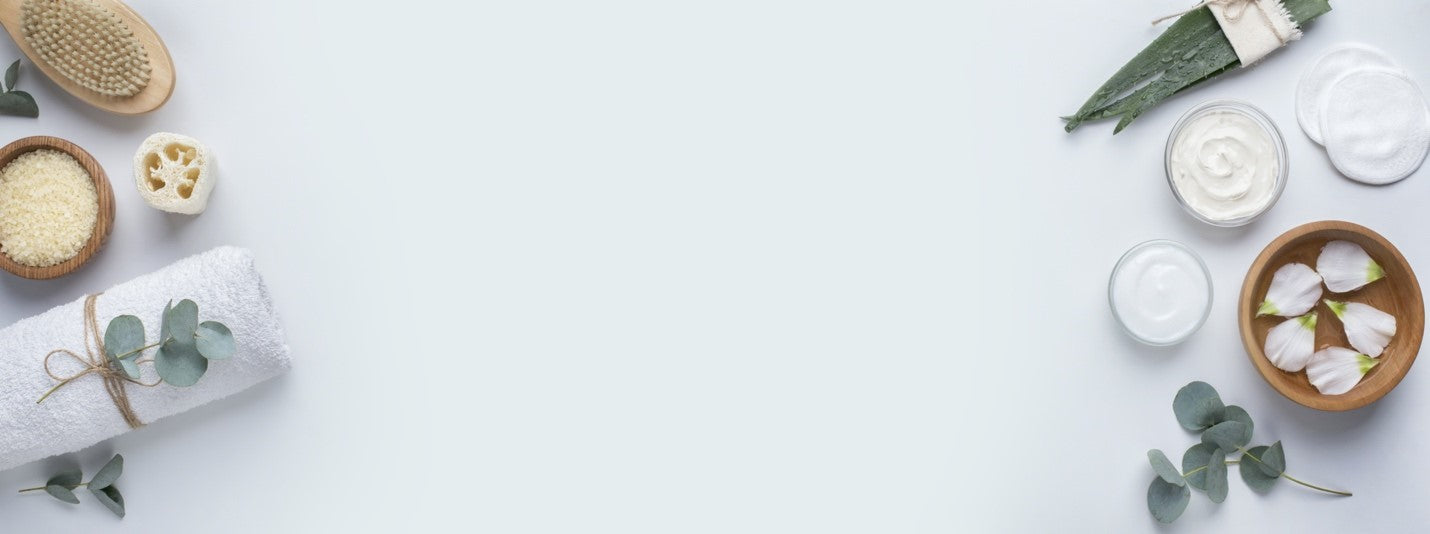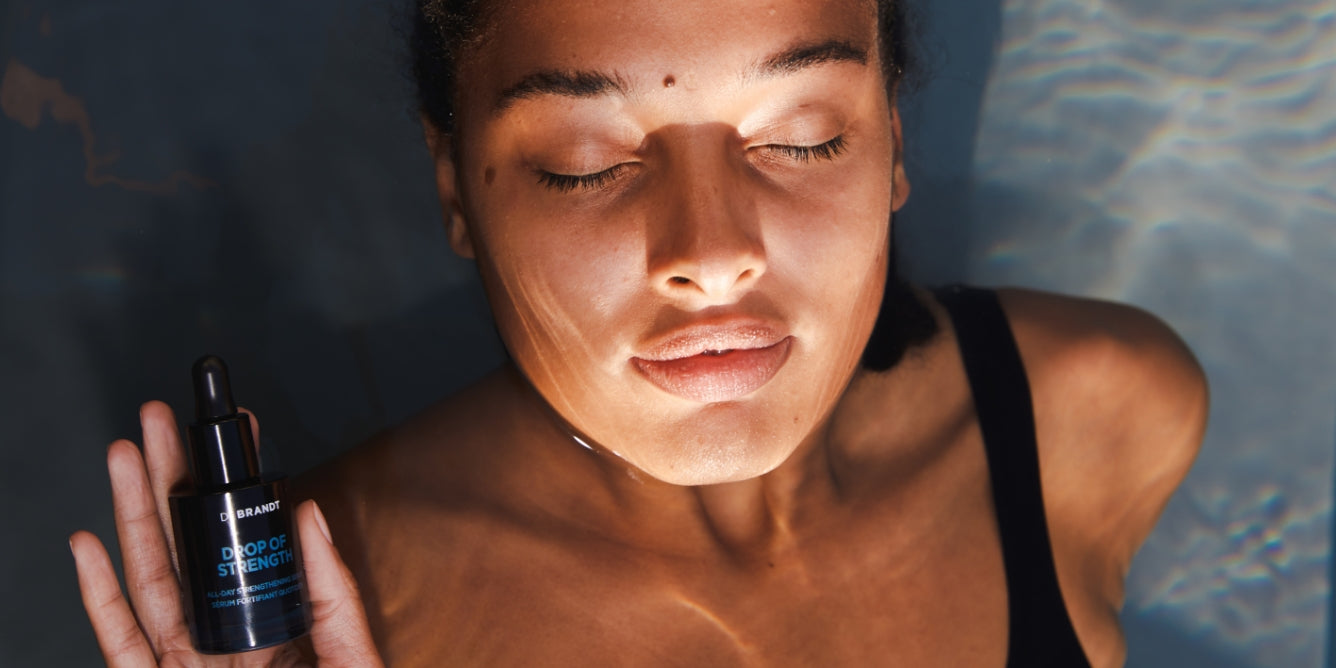
In today’s beauty industry, brands use a lot of different terms to define what is best for consumers and it can be confusing for many. “Clean Beauty” can involve many categories (serums,moisturizers, cleansers, etc.) and can address a variety of concerns (anti-wrinkle and fine lines, dry skin, sensitive skin, etc.). At Dr. Brandt® we want to communicate transparently about what clean beauty and clean ingredients really are.
What is clean beauty?
Clean:
The term “clean” is not strictly regulated and is defined differently from brand to brand. Typically, clean beauty includes a long list of “free from” ingredients, toxins and questionable ingredientsthe products are formulated without, like sulfates and parabens. Every brand has their own definition of clean and determines which ingredients they want to ban from their products. Unlike natural and organic skincare, clean beauty does not mean staying away from synthetic ingredients. For example, Hyaluronic Acid is a super safe and clean ingredient, albeit a synthetic one.
At Dr. Brandt®, we believe clean means being clinical. Our ingredients are good for your skin, safe and biocompatible. Every formula is dermatologist tested, clinically tested, and allergy tested, and every eye product is ophthalmologist tested. This rigorous testing ensures that our formulas are safe and that you never have to compromise your health for performance.
Vegan:
A formula is considered vegan if it does not include any animal-derived ingredients. The most common animal-derived ingredients used in skincare are beeswax, honey, milk and lanolin. People tend to think that a vegan product is natural, clean or nontoxic, but this is not always the case, as it can still contain chemical ingredients of concern. Today, most Dr. Brandt® products are vegan, with the exception of the Biotic collection, which includes the Biotic Balancing Complex™. This complex is powered by a yogurt powder prebiotic that works like a food supplement for the skin, supporting the growth of beneficial bacteria.
Nontoxic:
In skincare, a nontoxic product generally means that the level of ingredientsfor the intended use has not been shown to cause adverse health effects. It is important to note that a compound at normal-use levels may be non-toxic but can become toxic at higher levels. This is the case for water and oxygen, for example. Specifically, non-toxic products omit ingredients that have been linked to toxic responses in humans like neuro-disruption, hormone disruption, cancer etc., such as phthalates, coal tar, and formaldehydes.
Natural:
There is no legal definition of natural for cosmetics, this is why so many brands take such liberty with this term. In general, it means that at least some natural ingredients have been used in the formula, but a product can be labeled as natural and still contain a certain percentage of synthetic ingredients. At Dr. Brandt® we don’t discriminate based on an ingredient’s natural or synthetic state, instead we care more about its efficacy and that it’s safe for skin.
Green:
Like natural, there is no true definition of “green” when it comes to personal care, but it often means that the production of the product and its materials do not harm the environment. More and more skincare brands are taking the environment into consideration when creating products, and Dr. Brandt® is no exception. When we develop a sunscreen for example, we make sure to select mineral filters over chemical filters to not only protect our customers’ skin, but to also protect reefs’ marine environments. Every day, we also do our best to have a minimal impact on the environment by selecting packaging made from biodegradable materials. All of our cartons are 100% recyclable and by next year they will be FSC-certified. By the end of 2021, we have a goal to reduce plastic on our core product packaging by 60%.
Organic:
The FDA does not define or regulate the term “organic,” as it applies to cosmetics or personal care products. USDA regulates the term “organic” as it applies to agricultural products through its National Organic Program (NOP) regulation. If a cosmetic, body care product, or personal care product contains or is made up of agricultural ingredients, and can meet the USDA organic production, handling, processing and labeling standards, it may be eligible to be certified under the NOP regulations. Personal care products that are certified to be at least 95% organic bear an official USDA Organic Seal. Cosmetics, body care products, and personal care products may be certified to other, private standards and be marketed to those private standards in the United States. These standards might include foreign organic standards, eco-labels, earth friendly, etc. USDA’s NOP does not regulate these labels at this time.

Which ingredients to avoid in your skincare and makeup products
The following list of ingredients is a snapshot of the types of ingredients you will never find in Dr. Brandt® formulas. This list is far from being exhaustive, as we have a very extensive list of “not-to-use compounds” that we exclude from any new development going forward, like Phenoxyethanol and GMOs.
- Parabens
Parabens are a common class of preservatives and antimicrobial chemicals that prevent the growth of bacteria and mold in beauty products. Studies confirm that parabens mimic estrogen in the human body, with evidence linking them to reproductive organ harm, thyroid disruption and tumors. The European Commission banned five types of parabens for use in personal care products. All five are still approved for use in the United States, as, at this time, there is no proof that parabens used in cosmetics have an effect on human health, but we still choose not to formulate with them.
- Sulfates
Sulfates are cleansing agents that remove dirt and oil and are responsible for creating a lather in shampoos and soaps. Some are synthetic, and others are obtained from natural sources, like coconut or palm oils. Sulfates can cause irritation to the eyes and skin, resulting in redness or itching.
- Aluminum compounds
Aluminum compounds are used in antiperspirants to stop sweat ducts from releasing sweat to the surface of the skin and have been questionably linked to Alzheimer’s and breast cancer.
- Chemical Filters
Common chemical sunscreen ingredients, such as oxybenzone and octinoxate, can kill coral and damage coral reefs. Some chemical filters can also be absorbed into the body and enter the bloodstream. A safe alternative is non-nano zinc oxide, meaning the zinc oxide particles aren’t small enough to enter the bloodstream. Instead, they remain on the skin’s surface to form a protective shield, filtering both UVA and UVB rays.
- Hydroquinone
Hydroquinone is a skin lightener that has been linked to certain cancers and may cause ochronosis (darkening of skin) with long-term use on darker skin tones. Because of this perceived risk factor, the European Union alongside Japan and Australia have banned this ingredient. Dr. Brandt® Dark Spots No More replaces hydroquinone with a unique brightening concentrate consisting of three highly effective acids that work synergistically to target every stage of the melanin production process, fading the look of dark spots and preventing new ones from forming. Together the three acids,10% azelaic acid, 3% tranexamic acid and 2% Phytic Acid, make this highly effective formula one of the only brightening solutions gentle enough for all skin types.
- Mineral Oil
Mineral oil is a widely used moisturizing agent derived from petroleum that is known to contain toxins and may clog pores.
- Petrolatum
Petrolatum is made from petroleum. It can contain traces of toxic elements and may cover the skin and can keep it from "breathing".
- Phthalates
Phthalates are a group of chemicals found in everything from plastics to fragrances often used to keep materials (nail polishes, hair sprays, plastics, etc.) pliable. Phthalates have been linked to endocrine disruption and developmental and reproductive toxicity.
- Triclosan/Triclocarban
Triclosan/Triclocarban is an antibacterial and antimicrobial chemical used in soaps and hand sanitizers that has been linked to skin cancer and hormone disruption. In April 2019, the FDA issued a final rule banning OTC hand sanitizers from using triclosan.
- Synthetic Fragrances
The main issue with synthetic fragrances is that the components/ingredients of the fragrance do not have to be listed on the product; only "fragrance" is required. Therefore, many consumers are concerned about what might be in the fragrance. Fragrance on its own can be a trigger for allergies, since we don’t know exactly what ingredients are being used. Instead of synthetic fragrances, we use essential oils to naturally perfume Dr. Brandt® products.
- Artificial Color
Artificial colors are used in skincare to make products more visually appealing. The problem is that many synthetic colors are made from coal tar or petroleum, which can be contaminated with heavy metals such as arsenic, and can deposit toxicity onto the skin.
- GMO’s
GMO stands for Genetically Modified Organisms. Some botanical cosmetic ingredientsare derived from or contain components from GMO food products including corn oil, corn flour and soybean oil. Some consumers are concerned with their safety, but nothing has been proven yet when they are used in skincare.
Does clean beauty mean natural and synthetic free?
It is important to know that clean beauty does not necessarily mean natural. A clean product can use synthetic ingredients. Furthermore, not all natural ingredients are good for use in skincare, and not all synthetic ingredients are bad, so we don’t want to choose between them. At Dr. Brandt®, we always pick the best of each world. If selected carefully, both natural and synthetic ingredients can be safe and very effective. Sometimes, synthetics are even safer than natural ingredients. Oftentimes, synthetics are incredibly more effective.
We also believe that honesty and transparency are paramount to a brand that wants to be clean. We are never afraid to show what is in our products and what we stand for. We don’t follow trends, despite what many brands are doing, if they don’t make sense to us scientifically-speaking. We make sure that our formulas contain only safe ingredients for the skin and for the environment, and are also backed up with clinical and safety data. All of our products are allergy tested by dermatologists and are hypoallergenic. We don’t use any potentially harmful ingredients that can or are known to have negative effects on people or the environment. Our products are effective and always supported by strong clinical studies to prove their effectiveness.




Leave a comment (all fields required)